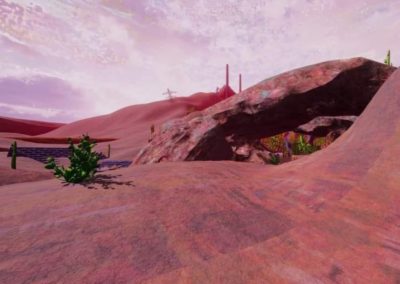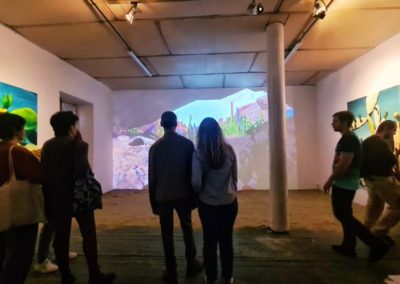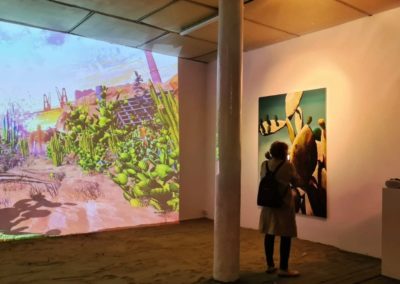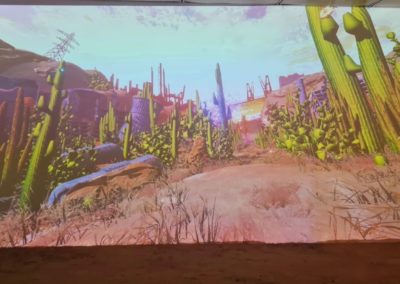Iulian Bisericaru (b. 1987) lives and works in Sibiu and Cluj-Napoca, Romania. He graduated from the Painting Department of the University of Arts and Design Cluj-Napoca (RO) and developed his PhD thesis on the relationship between architecture and painting, with a critical overview of the ecological ideology. Iulian Bisericaru’s artworks offer a somehow neglected or hidden perspective on aspects of contemporary society, that the human eye willingly avoids. Ironic and playful at the same time, Iulian Bisericaru invites the beholder to take a position on environmental issues, be it by depicting the remains of industrial society or by approaching the controversial topic of city planning and resource exploitation. The artist was awarded a grant for an ongoing virtual artistic residency organized by the European Alliance of Art Academies through Akademie der Künste, Berlin in 2022. During February – May 2019 Iulian Bisericaru attended the residency Cité Internationale des Arts, Paris and two years earlier he took part in the International Summer Residency in Aschersleben. In 2012 he was nominated for Start Point Prize and he also received the Expomaraton Award. In 2017 his work “Diebenkorn Background” (2016) was featured in the Italian journal La Lettura – Corriere dela Sera (July, 2017). His first artist book is published and launched in May 2022.
Dragoș Dogioiu is a Romanian New Media artist working with VR and AR experiences, being a long term collaborator and member of the Kinema Ikon group, representatives of Romania at the Venice Biennale. He has been part of important national and international exhibitions, notably the Pixels from a Past Future exhibition at the 2022 edition of the Ars Electronica Festival. Previous work was also hosted in Museums or private galleries. Currently he is teaching at the International Center for Research and Education in Creative Technologies, in subjects related to XR and digital world building.
Romain Pionrier, sound producer and composer, develops original compositions for documentary and fiction films. In 2014, he co-founded Mer-Noir Studios, allowing him to deepen his research and affirm a free and radical creative process in his way of thinking, composing and producing music. He accompanies artists, directors and musicians through the production of works and performances and develops projects such as the extreme noise band Uzhur or the radio collective Scalarstation.
The Cactus at the End of the World at Camera E12 – Malmaison Studios
27.05 – 26.06.2023
Artists: Iulian Bisericaru, Dragoș Dogioiu
Curator: Raluca Oancea (Nestor)
The Cactus at the end of the World represents an intermedia collaboration between Iulian Bisericaru, a painter interested in nature and ecology, connected to the ever-expanding urbanism and the ghosts of the post-industrial landscape, together with Dragoș Dogioiu, a new media artist specialized in the rendition of dystopic landscapes in Virtual Reality. Both artists are using technology in order to challenge concepts of ‘the world’ beyond anthropocentrism, and to promote a biocentric view that acknowledges the inherent value of non-human life forms. The works from the show is accompanied by a sound piece created by French producer and composer Romain Poirier. In the framework of the Niamor project he composed, We Are the Rest of Mankind.
In order to surpass the anthropocentric view that represents the world with humanity at its center, this visual endeavor presents a post apocalyptic world where cacti have remained one of the only inhabitants. In this immersive and emotional vegetal cosmos, the spectator is stimulated to consider unusual questions such as: What is the point of view of a cactus or of a piece of bone buried for a thousand years?
ARAC is a non-profit organization founded in June 2012, in order to produce and promote contemporary art in Romania and abroad. The initiative of the 58 Plantelor Residency belongs to Anca Poterasu, gallerist and ARAC President. The first edition of the Residency took place in 2015 and it was financed through a grant offered by Norway, Iceland, Liechtenstein and the Romanian Government.




